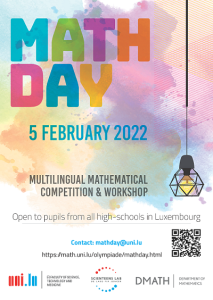On 5 February, the Maths Team of the Department of Mathematics organised for the very first time a mathematical competition involving 50 pupils from various high-schools in Luxembourg.
The organisers
The organisers behind the competition included Maths Team leader Antonella Perucca, Professor of Mathematics at the University of Luxembourg and Tara Trauthwein, who represented Luxembourg in the International Mathematical Olympiads (IMO) and now a PhD student at the University of Luxembourg.
Professor Perucca benefited from mathematical competitions in her youth thus was inspired to recreate a similar project here in Luxembourg. She placed an emphasis on the multilingual aspect of the competition as to make the competition accessible to pupils from all high-schools in Luxembourg.
The competition and winners
There were three categories (Junior, Intermediate and Senior) and the tests were in English, French and German according to personal preference. The competition was designed as follows: two hours competition in the morning and two hours of workshop in the afternoon where the pupils learned the mathematics behind the proposed problems.
The winners of the competition were the two ex aequo best results of the Senior category, Victor Guilbert and Marc Arnold Küster. They answered some of our questions:
1. Victor, how did you experience this challenge?
I experienced the challenge as a recreation, a great time. I have never associated math with school or unpleasant homework but always as an intellectual game, a beautiful and organized way to solve theoretical or practical problems. That’s why I’ve loved this challenge and it would be a pleasure to participate in another contest like this.
2. What do you like about maths?
“What I like most about maths is its underlying structure. Everything is built on logic, there are no exceptions. This creates a kind of universal language that knows no boundaries. Through physics, which is in many ways applied mathematics, the universe can be explained and modelled” said Marc.
“It’s not very common, but the thing I like the most in math is the modeling. It means to simplify complex interactions between lots of variables. For example, in the Theory of Games, you can model the entire democratic political game by a simple principle: “The only will of a politician is to be and stay” described by Mesquita in The Logic of Political Survive. This power to provide models makes math an incredible science” said Victor.
3. Marc, what is your strategy when you are about to resolve a math problem?
When confronted with a problem, I first write down everything that is given and make a sketch if necessary. Then I look at the goal, e.g., what needs to be proven or shown. This helps me to visualize it better and to find possible approaches. If this doesn’t work, I often try to solve the problem backwards or (especially with geometric proofs) to calculate as much as possible from the given values. If I still don’t get anywhere, I put the problem aside and come back to it later. Often, with the second, third or even fourth attempt, I recognize things and connections that make it possible to solve the problem.
4. Do you wish to continue studying maths? and what is your goal?
“Even though I do not plan to study mathematics, I will certainly not stay far from the field. If I had to choose now, I would study mechanical engineering, which sort of is applied mathematics and physics. Maths will undoubtedly always be an important part of my career”, Marc Arnold Küster
“My dream is to become a researcher. I have two particular domains in mind: theoretical physics and applied mathematics” said Victor Guilbert.
The webpage with this year questions, problems and solutions is available here. Information regarding the 2023 Math competition can also be found on the webpage.
